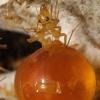Hey all,
So I am currently keeping a Camp. pennsylvanicus. colony that seems to have run into some issues. I was hoping you all might have some suggestions about how to address it.
So I caught this queen in May of 2017. Last year the colony did very well, going from just the queen to a little over 30 workers before I placed the colony into hibernation at the end of October. I kept the colony in diapause for approx. 4 to 4 1/2 months at approx. 42-44 degrees Fahrenheit. I took them out of hibernation in March, and they seemed to do well after that also. Only one worker did not survive hibernation. All of the brood survived, and after a couple months the colony had reached 60+ workers.
Then, since sometime in June, the colony has seemingly just stopped functioning. Previously they were very receptive to both mealworms and crickets, but now they have stopped foraging altogether. The queen has stopped laying eggs - she has not laid since shortly after being taken out of hibernation. Some of the workers have begun to die off - I am not sure if this is a cause for concern or not, as it could just be that some of her first round of workers have reached the natural end of their lifespan, but the colony is now down below 50 workers.
It seems as if the colony has just decided that it is time to enter hibernation. In the middle of the summer. They are kept in a room that stays between 70-72 F and have a heating cable running along one side of the formicarium that keeps that portion around 82 F. So, there should not be any temperature cues telling them to hibernate.
Overall, I am just not sure what is going on with the colony and am concerned that there is something wrong with their environment, but I don't know what it is or how to fix it. The colony was doing so well for over a year, especially compared to other Camp. pennsylvanicus. colonies that I have observed, but then suddenly ran into a roadblock. I want to put them back on the path to success!
Does anyone have any insight or advice as to what may be going here? All help is much, much appreciated. Thanks in advance for your replies.
- Formiculture.com
- Forums
- Gallery
- Members
- Member Map
- Chat















